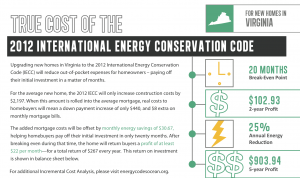The impact and next steps of Virginia’s Board of Housing and Community Development on building codes
A lot has happened on the building codes front since we put out a call for nominees for the board of the Virginia Department of Housing and Community Development (DHCD). As you may recall, this board is charged with updating Virginia’s building codes.
 The board is comprised of 14 members: 11 appointed members who represent Virginia’s congressional districts and three ex-officio members who represent the Virginia Housing Development Authority (VHDA); the Virginia Building Code Officials Association (VBCOA); and the Virginia Fire Services Board (VFSB).
The board is comprised of 14 members: 11 appointed members who represent Virginia’s congressional districts and three ex-officio members who represent the Virginia Housing Development Authority (VHDA); the Virginia Building Code Officials Association (VBCOA); and the Virginia Fire Services Board (VFSB).
Over the last several years, the makeup of this board has changed in a positive way. As a demonstration of his commitment to energy efficiency, Governor McAuliffe has appointed several members to this board, including one specifically recruited by the VAEEC, who acknowledge the science and economics that support rigorous energy codes.
However, even with the new board diversity, there is much work to be done. In 2014, Virginia adopted the 2012 “model” building codes published by the ICC with amendments. In the case of the residential codes section, Virginia’s amendments created a code that looks more like the 2009 IECC rather than the 2012 IECC. Per Virginia policy, amendments made in previous years stand until they are expressly removed or altered by the board.
Given that there are few substantive changes between the 2012 and 2015 IECC standards, if Virginia does not adopt these new standards, we will remain woefully behind our neighbors who have already adopted the 2012 and/or 2015 IECC standards for new homes.
Check out this great fact sheet on Virginia and the 2012 IECC codes.
In the most recent State Energy Efficiency Scorecard, the American Council for an Energy Efficient Economy (ACEEE) ranked Virginia 28th in the country on building code regulations, and there is still considerable work to be done.
Currently, the only change to the 2012 residential amendments that has received support from the board is changing the requirement for high efficiency lamps in new homes from 50% to 75% (an improvement the DHCD board declined during the last cycle). VAEEC Governance Board member Andrew Grigsby of the Local Energy Alliance Program (LEAP), has two proposals before the board to require mechanical testing to measure residential building air-tightness and duct leakage (doing away with the visual inspection options). These proposals will be taken up at the next meeting on October 24th along with:
- Commercial energy codes: Maintaining current projection factors and Solar Heat Gain Coefficient (SHGC) formulas and declining weaker 2015 IECC specs for this element.
- Eliminating the credit for on-site generation in the Energy Rating Index compliance option.
- Increasing the requirement for exterior wall insulation from R15 (or R13 cavity + R1 insulated sheathing) to R20 (or 13+5).
Proposals that were voted out unfavorably at the September Codes and Standards Committee:
- Adopting the 2015 IECC without alteration
- updating the attic insulation requirement from R-38 to R-49 (per the 2012 IECC)
- Requiring that replacement windows meet minimum efficiency requirements when a permit is required (per the 2012 IECC)
- Removing an amendment allowing efficiency trade-offs in buildings with less fenestration (per the 2012 IECC)
 The Governor’s Executive Committee on Energy Efficiency has been presented data showing advanced building energy codes should be a vital component for Virginia to meet its goal to reduce energy consumption ten percent by 2020.
The Governor’s Executive Committee on Energy Efficiency has been presented data showing advanced building energy codes should be a vital component for Virginia to meet its goal to reduce energy consumption ten percent by 2020.
Everyone wins when new homes are built to the most cost-effective efficiency standards: consumers, builders, trades, grid operators, and society as a whole. This is why VAEEC continues to support rigorous energy codes.
Upcoming Important Dates:
10/24/16: DHCD board committee meets to approve or reject remaining proposals
11/21/16: DHCD Board meets to adopt draft proposal of new code regulations
Winter 2017: Draft regulations published in the Virginia Register for public comment
February-June 2017: Public comment period on draft regulations
6/19/17: Public Hearing on draft regulations
September and October 2017: DHCD board committees meet to vote on final regulations
November 2017: DHCD board adopts final code regulations
The full DHCD board timeline found here. Or check the DHCD website for details.
